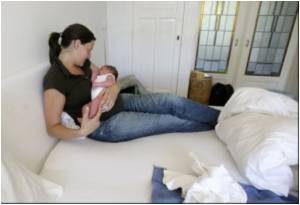On average, German women have 1.3 children, among the lowest rate in the industrialised world, resulting in a shrinking and ageing population that threatens long-term finances and the ability of companies to find workers.

However Family Minister Kristina Schroeder does not see the government's annual 200 billion euro ($264 billion) family policy as a failure.
"I am sceptical about the capacity for politics to manage families," she told reporters Thursday, adding that in terms of encouraging women to have more babies "my ambitions are modest."
However Germany's policies have often been criticised by the Organisation for Economic Cooperation and Development in Europe for hindering women being able to combine work and motherhood.
And the chancellor herself, who is childless, has highlighted several times that Germany's family policy is wanting compared to that of neighbouring France for example.
Michaela Kreyenfeld, of the Max Planck Institute for Demographic Research, said Germany's family policy "lacks coherence".
Advertisement
Nevertheless Merkel's conservatives, who are seeking re-election in three months time, plan to stay on the same path -- their platform includes more tax advantages for families, and a still unspecified hike in child benefits.
Advertisement
But her critics say there is no reason to suppose Germans are any unluckier in love than the French, British or Icelanders who all have substantially higher birth rates.
"Germany still tries too much to solve problems with money and not enough with infrastructure" such as more creches, complained Friday's Sueddeutsche Zeitung newspaper.
Mass circulation Bild scoffed at the government having judged its family policy a success and pointed to the system in Scandinavian countries, Iceland and France. "It's actually quite simple. It works everywhere where there are many women working and where there is good childcare."
"Why is that so difficult to understand?"
-- Small families now seen as the norm --
In Germany, more than one woman out of three with a university education is childless, which, according to Kreyenfeld, is "because they have to choose between children and career, they don't manage to reconcile the two".
Juggling home and work life and the need to get more women back to work after having children is a problem the government is keenly aware of and has been seeking to address for nearly a decade.
From August 1 every child from the age of one will have the right to a childcare spot, although the promise currently looks set to be difficult to achieve given a lack of spaces in creches, which are run by local authorities.
Another problem is that German couples with children are unlikely to have more than two, unlike in France where families with three or four children are more common, according to Kreyenfeld.
"France conducts a proactive birth policy and that is not the case in Germany due to historic factors," she said. Spurring people to have lots of children has negative connotations after the Nazi regime's idealisation of large German families.
Vera Kreuter, of the Berlin Institute for Population and Development, said not having lots of children had now become "the social norm" and was not going to change any time soon.
But she said that was no reason to stop trying to foster a turnaround.
"To stimulate the birthrate by encouraging people to fulfil their wish for a child must be an aim of family policy, not the only one, but one of them," she told AFP.
Merkel has warned that demographics is one of the biggest challenges that Germany faces this century as the motor of Europe's economy faces labour shortages and its pension system becomes strained.
On visits abroad she has explicitly urged young professionals to seek work in Germany, which will eventually require some 200,000 new foreign workers per year, according to officials.
Source-AFP









